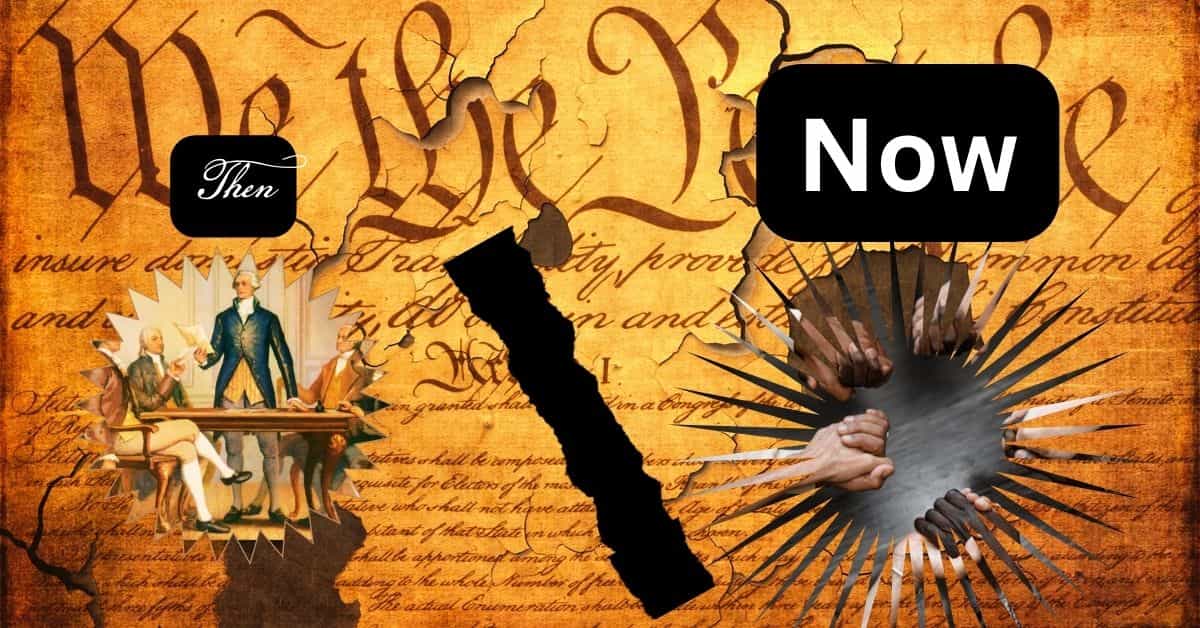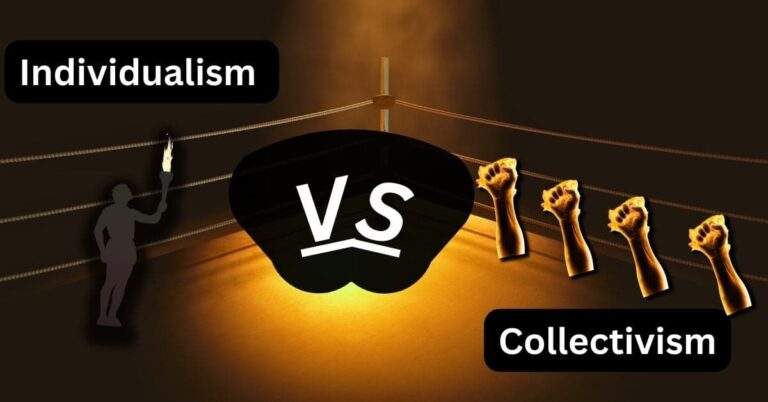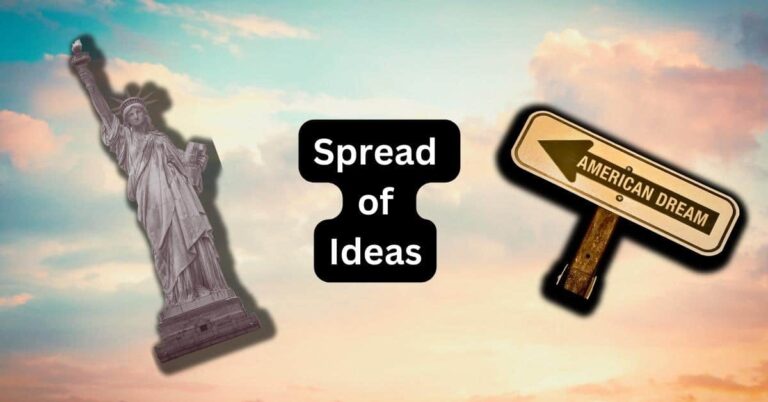A phrase wrapped in so much meaning. It’s the foundation of a country. Or is it? Some declare different ideas on the actual definition.
“We the People” generally means the populous have sovereignty over the government. Its definition evolved to include all U.S. citizens. Constitutional scholars propose 2 further interpretations: Democratic or Republican viewpoints. Democratic is by popular vote, and Republican is by representative ballot.
Further discussion comprises the inclusivity of the term. Some question the Constitution’s legitimacy due to what the Founders didn’t mean in these epic words.
Find out below as I explain all this turmoil.
Significance of “We the People”
Looking down at the Constitution from a desk, you see the words boldly “We the People”. You don’t have to put on eyeglasses to see them because they’re so large.
These 3 magical words set the tone for the whole Constitution. They’re like a book’s title. Without thinking too much, you realize it talks to you.
In popular culture today, “We the People” pervades every aspect of society. So, it must be important, right?
When pondering the meaning, ask yourself these questions:
- Who are the “people”?
You and I are “the people. Your neighbor is too. When you see a government vehicle on the road, you’ll see the license says “gov’t servant”. This means they serve you. You pay a teacher’s, a cop’s, and even the Mayor’s salary through your tax dollars.
The Founders designed our constitutional system to promote political participation. No mob rule allowed.
- Where are the origins of this phrase?
During the Constitutional Convention, James Madison and many other founders worried about political power distribution. They wanted to make sure that a monarch didn’t have it.
Back in the day, kings ruled by divine right. A monarch asserted authority based on family history and bloodline.
People started not to like that too much. And change would soon happen
- What or who gives the “We the People” the power?
We live under a social contract established by philosophers and intellectuals when we obey government laws.
In the Declaration of Independence, this is the phrase that reads like this:
“Governments are instituted among Men, deriving their just powers from the consent of the governed…”
Declaration of Independence
Thomas Jefferson, the Declaration’s author, emphasized that the government needs “We the People’s” approval to govern us.
We grant the government power to make laws for all of us to abide by. If we feel they aren’t doing their job, we use the civic process and vote these individuals out of office.
The Declaration of Independence emphasizes that “We the People” have the final say in government. The President or Congress aren’t your boss.
Democratic or Republican Constitution: The Difference
Modern debates on the interpretation of these 3 words. The Democrats see it one way and the Republicans see it another way.
In my research, I encountered 2 books describing the fundamental differences.
- We the People: A Progressive Reading of the Constitution for the Twenty-First Century by Erwin Chemerinsky
- Our Republican Constitution: Securing the Liberty and Sovereignty of We the People by Randy Barnett
Both constitutional scholars- Randy Barnett and Erwin Chemerinsky- differ in their approaches.
One book leans Left while the other leans right. You can look at the titles to judge for yourself which does what.
The Left-Wing approach views “We the People” as a collective entity. Whatever the majority decides will prevail, regardless of a minority’s opinion.
Right-wingers- or the libertarian approach- view “We the People” as a group of individuals. Each person has a distinct say in what goes on.
The saga is about interpretation and viewpoint. And the basic difference is a battle royale between the individual vs the collective will.
| Perspective | Majoritarian (Democratic) | Republicans |
| Concept | “We the people” as the collective whole | “We the people” as individual persons |
| Governance | Majority rule through democratic bodies of elected representatives | Emphasis on individual rights |
| Judges | Not elected; viewed as problematic | Appointed for life; Counteracts bad legislation through judicial action |
| Government | Reflects the will of the people through actions | Government’s primary role is to protect individual rights |
| Supreme Court | Seen as potentially thwarting the will of the people | Seen as a mechanism to keep the government within its just powers |
| Legitimacy | Questions arise if actions do not have majority or supermajority support; legitimacy tied to winning | Legitimacy derived from the protection of individual rights |
| Governance | Majority should govern; terms like “protecting democracy” are used to justify actions | Obedience to law rests on individual consent; if each individual lacks consent, then it’s not truly popular governance |
| Viewpoint | Tends to lean towards a more democratic perspective | Reflects a more Constitutional republic viewpoint |
| Promoters | Left-Wing | Right Wing |
| Motto | First comes government, and then comes rights. | “First comes rights, then comes government” |
The chart summarizes the viewpoints. Left-wingers want a more popular vote Constitution. The Republicans like a more representative body approach.
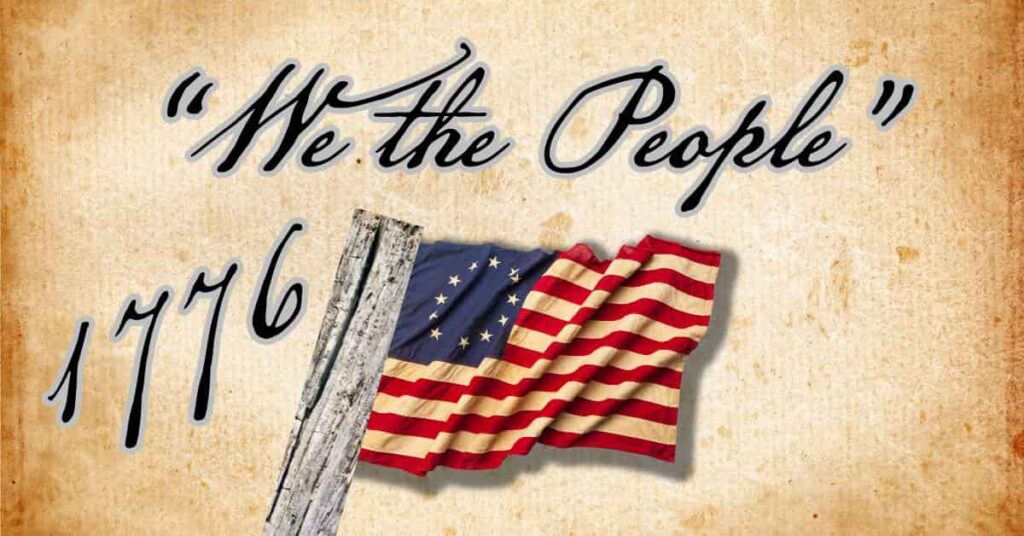
Then- Revolutionary War Viewpoint
When the Founders wrote the Constitution, our republic contained 3.9 million people. Now, we’re well over 330 million. That’s over an 8,400% population growth since our founding.
Attitudes and ideas changed over 230 years.
The attitudes presented above are the modern interpretations. 18th Century “We the People” meant white, middle-class landowners. Progressives highlight as the main reason for advocating a majoritarian “We the People”.
They also emphasized African Americans, Indigenous, and women couldn’t participate in politics. While that is true, it is a great weakness in our beginning republic. Yet, they fail to mention why the great social changes happened.
Our constitutional system allowed these changes to take place. Political power distribution is a genius of “We the People”.
I will guarantee movements promoting equality wouldn’t have happened in other parts of the world.
Moreover, after discussing the 18th-century interpretation. Let’s explore a brief history as to the why. Revolutions bring about quick changes in feelings and procedures.
We established kings ruled by divine right. Therefore, the English king and British parliament ruled over the colonies passing legislation.
Before 1776, England passed many acts: the Stamp Act and the Intolerable Acts. These measures passed illegitimate taxes on the colonists. As a result, colonists questioned the British authority and sovereignty.
A widespread term called popular sovereignty arose.
Defined as governments derive their power from the people’s consent.
Popular Sovereignty
This is a foundational term for “We the People”.
Each branch of government is responsible to the people’s will- including the President.
Thus, left-wingers want popular sovereignty within the group. For instance, they want the President directly elected through the popular vote. The Electoral College needs to disappear. That’s “true” democratic rule.
Right-wingers want sovereignty within each person. The electoral college protects the “little guy” from mob rule.
Overall, the Founders viewed popular sovereignty as a safeguard against excessive government power. The British parliament became a prime example of tyranny.
What do the other parts of the Preamble mean? LEARN MORE about the Preamble’s 6 goals that the Founders intended.
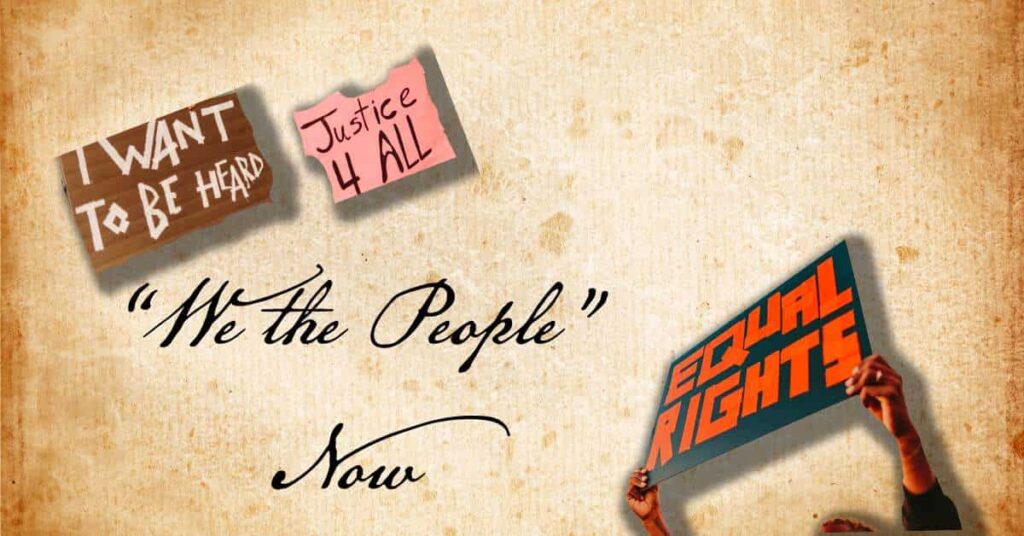
Now-Equality and Inclusivity
The “Now” interpretation of “We the People” represents the Democrat’s or Majoritarian viewpoint.
A prominent part of the perspective includes how much power judges hold. While each government branch should be separate, Democrats see judges as czars against legislative action.
Judges hold lifetime appointments to the U.S. Supreme Court. Why should they?
Each house of Congress at least has an election cycle. Every representative is up for reelection every 2 years while senators are every 6 years.
In their belief, elections hold representatives more accountable to “We the People”. Judges undo much-needed legislation.
Guns are always a prominent political issue. Should there be strict gun control laws? Do legislatures overstep constitutional authority by undermining the 2nd amendment?
2008 became a legendary year for pro-gun and 2nd amendment supporters. The U.S. Supreme overruled longtime D.C. legislation. Gun ownership became an individual right.
The Democrats saw this as a loss. Activist judges ripped off the American public making it more unsafe for “We the People”. This decision invalidated gun safety legislation enacted by duly elected representatives.
When Judges rule legislation unconstitutional, Democrats feel unrepresented.
On the other hand, the Republicans saw it as a win for individual rights. The D.C. handgun ban overreached into a person’s right to self-defense recognized by the 2nd Amendment.
Moreover, Democrats praise social movements to represent more “We the People”.
- Slavery ended with the 14th Amendment
- FDR and his New Deal economic proposals
- Civil Rights Movement
Left-wing supporters stress this as the inclusivity starting point for “We the People”. They modified economic policies and voting procedures to reconstruct American society.
Ever wonder about the negatives about the Constitution? LEARN MORE as I tell you the pros and cons of our country’s founding document.
Conclusion
“WE THE PEOPLE” is a phrase you should read in all CAPS. It helps to emphasize the people’s sovereignty in American history.
2 interpretations exist: Democratic vs Republican. Another way to view it is the collective vs the individual. Are the People a whole body? Or are they a collection of individuals?
I discussed a little history about the original meaning. The Founders helped bring popular sovereignty into the mainstream.
“We the People” evolved to a more inclusive overall definition since the 18th century. For instance, women and African Americans now can vote.
In modern initiatives, Left-Wingers advocates for better representation with the following movements:
- gay equality movements
- immigrant rights
- police reform
- economic rights entitlements
Also, Democrats want legislative initiatives to stay intact. Republicans see judges as part of the constitutional checks and balances system. Sometimes legislatures need to be told “no” by another branch.
All politicians should carry a card with “We the People” in bold print. They need to understand who their boss is, and their accountability is to us.
Abraham Lincoln would be proud of his famous line:
“Government of the people, by the people, for the people, shall not perish from the Earth…”
Abraham Lincoln
Do you think you’re included in “We the People”? Well, you are. Some people will try to tell you’re not but I’m here to tell you that you are.
J. Liberty~~~~ “Stoking the Flames of Freedom” ~~~~
References:
Barnett, R. (2016). Our Republican Constitution: Securing Liberty and Sovereignty of We the People. New York: Broadside Books.
Barnett, R. E. (2013). We the People: Each and Every One. Yale LJ, 123, 2576.
Chemerinsky, E. (2018). We the People: A Progressive Reading of the Constitution for the Twenty-First Century. New York: Picador.
Kilberg, A. G. (2014). We the People: The Original Meaning of Popular Sovereignty. Va. L. Rev., 100, 1061.
Strauss, D. A. (2012). We the People, They the People, and the Puzzle of Democratic Constitutionalism. Tex. L. Rev., 91, 1969.
Photo Credits
Photo Credits:
© allanswart via canva.com
© bulat silvia via canva.com
© wildpixel via canva.com
© doidam10 via canva.com
© RyanJLane via canva.com
Photo Credits
Photo Credits:
©mitchellpictures via canva.com
© nairi from corelens via canva.com
© The Everett Collection via canva.com
© inhauscreative via canva.com
